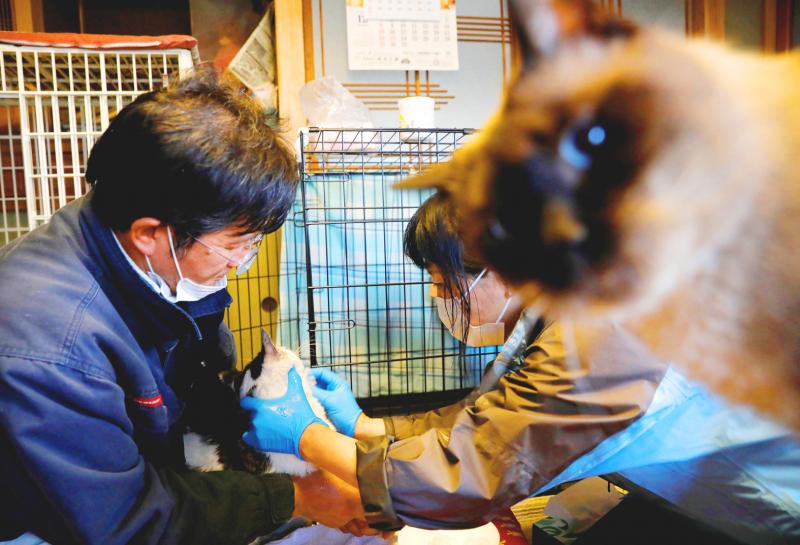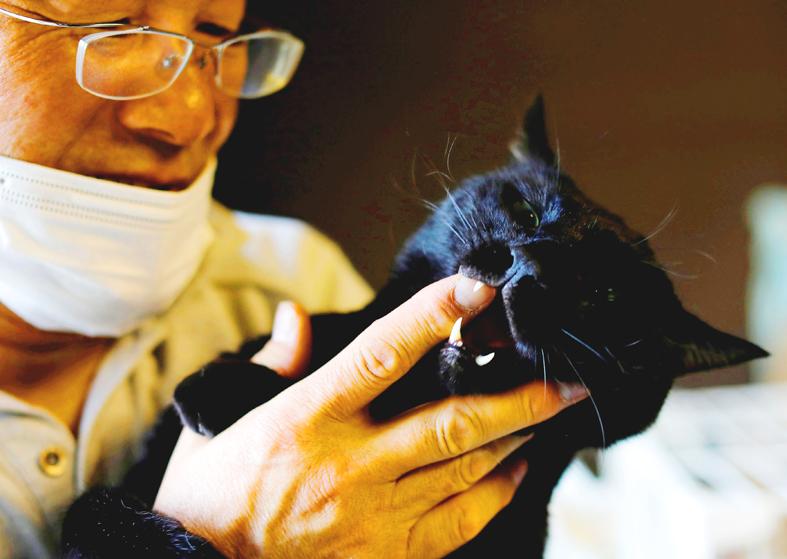A decade ago, Kato Sakae stayed behind to rescue cats abandoned by neighbors who fled the radiation clouds belching from the nearby Fukushima Dai-ichi nuclear power plant. He still refuses to leave.
“I want to make sure I am here to take care of the last one,” he said from his home in the contaminated quarantine zone. “After that, I want to die, whether that be a day or hour later.”
He has so far buried 23 cats in his garden, the most recent graves disturbed by wild boars that roam the depopulated community. He is looking after 41 others in his home and in an uninhabited building on his property.

Photo: Reuters
Kato leaves food for feral cats in a storage shed that he heats with a paraffin stove. He has also rescued a dog, Pochi.
With no running water, he has to fill bottles from a nearby mountain spring and drive to public toilets.
The 57-year-old, a small construction business owner in his former life, said that his decision to stay as 160,000 other people evacuated the area was spurred in part by the shock of finding dead pets in abandoned houses that he helped to demolish.

Photo: Reuters
The cats also gave him a reason to stay on land that has been owned by his family for three generations.
“I don’t want to leave. I like living in these mountains,” he said, standing in front of his house, which he is allowed to visit but, technically, not allowed to sleep in.
The two-story wooden structure is in poor condition.
Rotten floorboards sag. It is peppered with holes where wall panels and roof tiles that kept the rain out were dislodged by a powerful earthquake last month, stirring frightening memories of the devastating quake on March 11, 2001, that led to a tsunami and a nuclear meltdown.
“It might last another two or three years. The walls have started to lean,” Kato said.
Decontamination in fields near his house signal that other residents are soon to be allowed to return.
He estimates that he spends US$7,000 per month on his animals, part of it to buy dog food for wild boars that gather near his house at sunset. Farmers consider them pests, and also blame them for wrecking empty homes.
On Thursday last week, Kato was arrested on suspicion of freeing wild boars caught in traps set by the Japanese government in November last year.
At the time of writing, he was still being detained for questioning.

ELECTION DISTRACTION? When attention shifted away from the fight against the militants to politics, losses and setbacks in the battlefield increased, an analyst said Recent clashes in Somalia’s semi-autonomous Jubaland region are alarming experts, exposing cracks in the country’s federal system and creating an opening for militant group al-Shabaab to gain ground. Following years of conflict, Somalia is a loose federation of five semi-autonomous member states — Puntland, Jubaland, Galmudug, Hirshabelle and South West — that maintain often fractious relations with the central government in the capital, Mogadishu. However, ahead of elections next year, Somalia has sought to assert control over its member states, which security analysts said has created gaps for al-Shabaab infiltration. Last week, two Somalian soldiers were killed in clashes between pro-government forces and

Ten cheetah cubs held in captivity since birth and destined for international wildlife trade markets have been rescued in Somaliland, a breakaway region of Somalia. They were all in stable condition despite all of them having been undernourished and limping due to being tied in captivity for months, said Laurie Marker, founder of the Cheetah Conservation Fund, which is caring for the cubs. One eight-month-old cub was unable to walk after been tied up for six months, while a five-month-old was “very malnourished [a bag of bones], with sores all over her body and full of botfly maggots which are under the

BRUSHED OFF: An ambassador to Australia previously said that Beijing does not see a reason to apologize for its naval exercises and military maneuvers in international areas China set off alarm bells in New Zealand when it dispatched powerful warships on unprecedented missions in the South Pacific without explanation, military documents showed. Beijing has spent years expanding its reach in the southern Pacific Ocean, courting island nations with new hospitals, freshly paved roads and generous offers of climate aid. However, these diplomatic efforts have increasingly been accompanied by more overt displays of military power. Three Chinese warships sailed the Tasman Sea between Australia and New Zealand in February, the first time such a task group had been sighted in those waters. “We have never seen vessels with this capability

‘NO INTEGRITY’: The chief judge expressed concern over how the sentence would be perceived given that military detention is believed to be easier than civilian prison A military court yesterday sentenced a New Zealand soldier to two years’ detention for attempting to spy for a foreign power. The soldier, whose name has been suppressed, admitted to attempted espionage, accessing a computer system for a dishonest purpose and knowingly possessing an objectionable publication. He was ordered into military detention at Burnham Military Camp near Christchurch and would be dismissed from the New Zealand Defence Force at the end of his sentence. His admission and its acceptance by the court marked the first spying conviction in New Zealand’s history. The soldier would be paid at half his previous rate until his dismissal